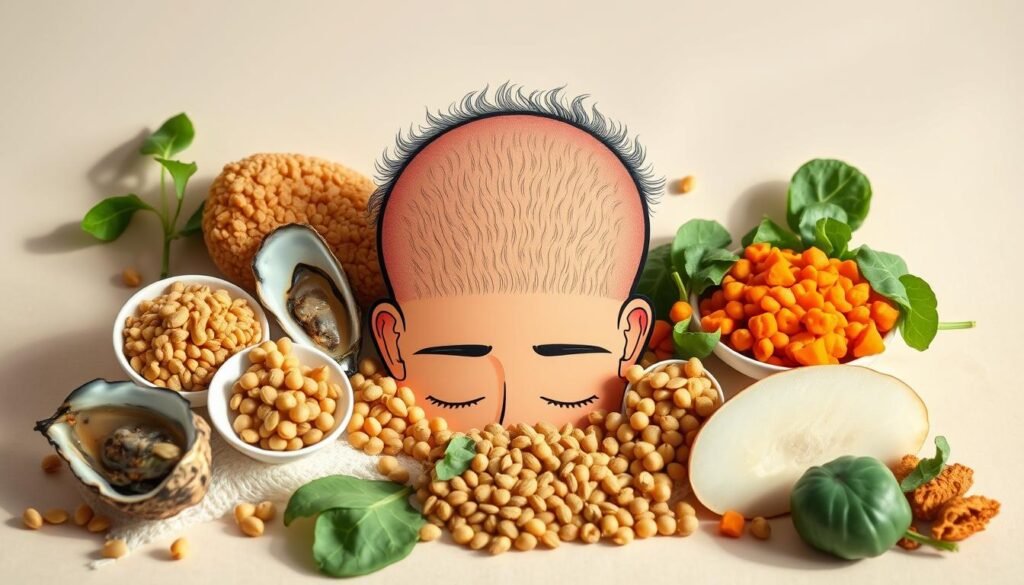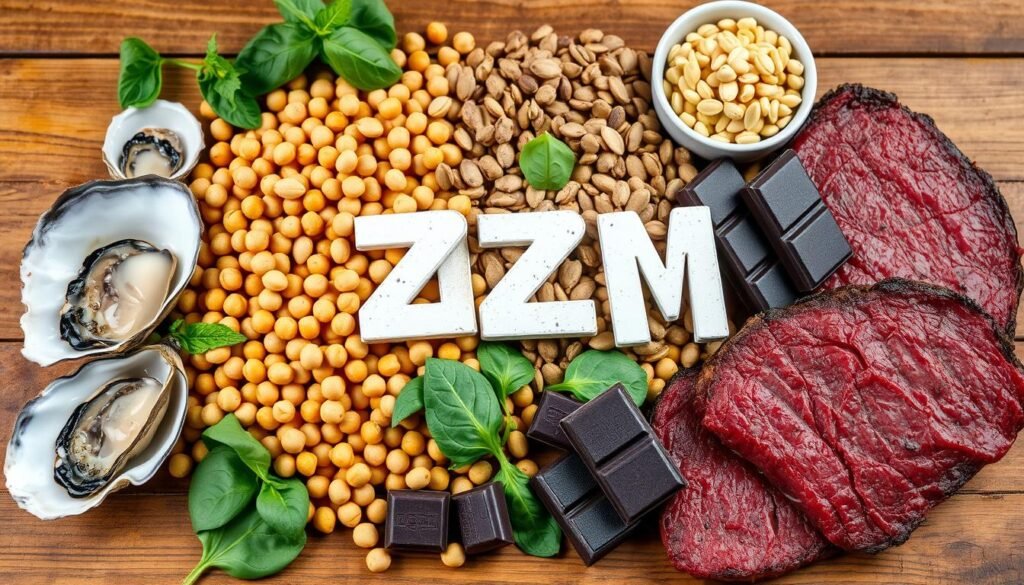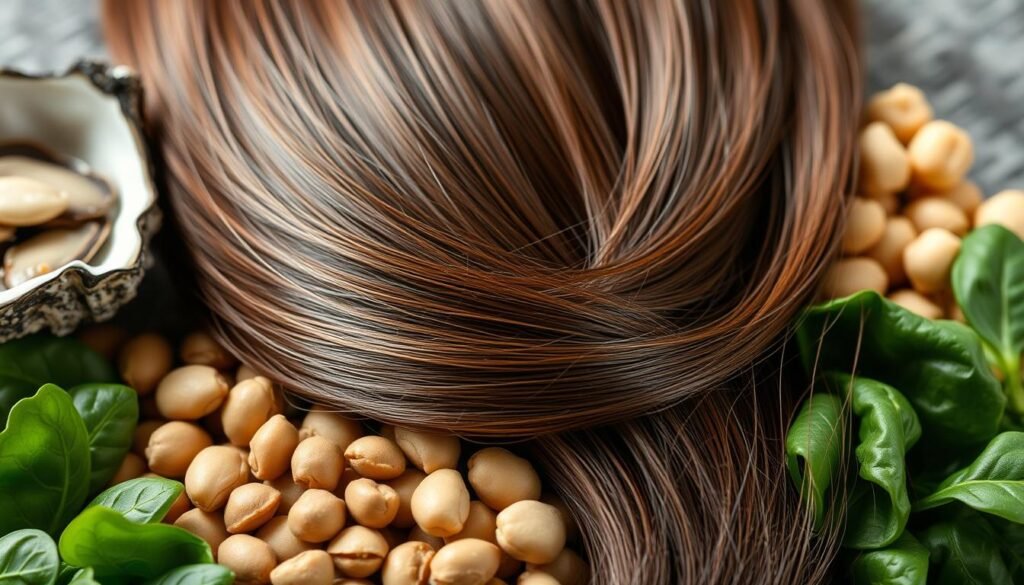Did you know half the people will fight dandruff at some time? This common scalp issue does more than annoy. It can lower self-esteem and hurt hair health. Knowing how a diet rich in zinc helps is key to fight dandruff.
Zinc keeps the scalp healthy by supporting cell functions and hair growth. This article will cover the top foods full of zinc. We’ll find out the best sources of dietary zinc. This helps decrease dandruff and helps make hair beautiful.
Key Takeaways
- Zinc is essential for scalp health and hair growth.
- A zinc-rich diet can significantly reduce dandruff.
- Oysters, beef, and spinach are some of the top zinc-rich foods.
- Incorporating zinc-fortified foods can be a convenient option.
- Zinc deficiency negatively impacts overall hair health.
Understanding Dandruff and Its Causes
Dandruff is a common condition that affects the scalp. It’s often seen as flaky skin. Understanding the causes of dandruff is key to treating and preventing it.
Dry skin is a main cause of flaking, especially when it’s cold. But, severe dandruff may come from seborrheic dermatitis. This leads to oily, red patches and white or yellow flakes.
Sensitivity to hair products can also cause dandruff. Ingredients in these products may cause scalp reactions. This makes the scalp itchy and flaky.
Different parts of personal care and environment affect scalp health. Knowing these helps control dandruff and improve scalp care.
| Cause | Description |
|---|---|
| Dry Skin | Flaky skin due to a lack of moisture, often worsened during winter. |
| Seborrheic Dermatitis | Chronic condition leading to oily patches, red skin, and yellowish flakes. |
| Product Sensitivity | Allergic or irritant reactions to certain hair care products. |
| Fungal Growth | Overgrowth of Malassezia yeast on the scalp, increasing irritation and flaking. |
| Poor Scalp Care | Infrequent washing or lack of moisturizing can contribute to dandruff. |
What Role Does Zinc Play in Scalp Health?
Zinc is a key mineral for scalp health. It helps with cell function and fighting off germs, important for keeping hair roots healthy. With enough zinc, your hair can grow strong and your scalp stays healthy.
Not having enough zinc can cause hair problems like zinc deficiency hair loss. People may see their scalp become dry and flaky, or their hair might not grow as fast. But, if you get enough zinc, it can shield your scalp and help hair roots heal and grow.
Eating foods rich in zinc can prevent these scalp issues. This way, your body gets the zinc it needs. It helps you tackle hair and scalp problems before they get worse.

| Zinc’s Functions | Impacts of Zinc Deficiency |
|---|---|
| Supports cellular function | Results in weakened hair follicles |
| Enhances immune response | Increases susceptibility to scalp infections |
| Promotes hair growth | Leads to hair loss and thinning |
| Helps maintain scalp moisture | Causes dry, flaky scalp |
Top Zinc-Rich Foods for a Healthy Scalp
Incorporating Top Zinc-Rich Foods for a Healthy Scalp can make your scalp healthier. It may also help in fighting off dandruff. Here are some great options to add more zinc to your meals.
Oysters: Nature’s Zinc Powerhouse
Oysters are a top choice for zinc. Even a small amount is packed with this nutrient. They are excellent for improving scalp health. You can eat them raw, baked, or in a seafood dish to enjoy their benefits.
Beef: A Delicious Source of Zinc
Beef is perfect for protein lovers. A small 3-ounce piece of lean beef has about 5-7 mg of zinc. You can grill or roast beef, or mix ground beef into tasty recipes, to increase your zinc intake.
Spinach: A Nutrient-Dense Green
Spinach is great for those who love plants. It has less zinc than meat but is still valuable. Add fresh spinach to salads, smoothies, or dinner dishes for health perks.
| Food Item | Zinc Content (mg per serving) | Serving Suggestions |
|---|---|---|
| Oysters | 74 | Raw, baked, or in seafood pasta |
| Beef | 5-7 | Grilled steak or in stir-fries |
| Spinach | 1.1 | Salads, smoothies, or sautéed |
Adding these foods high in zinc to your diet supports scalp health. It also brings other health benefits. A balanced intake of these foods improves overall well-being.
Additional Best Dietary Zinc Sources
Eating a variety of zinc-rich foods is key to good health, which includes better hair and scalp. Nuts and seeds are great because they’re easy to eat and boost your zinc levels. These little snacks are tasty and full of important nutrients.
Nuts and Seeds: Small Snacks with Big Benefits
Pumpkin seeds and cashews are top sources of dietary zinc. They provide a lot of zinc, healthy fats, and protein. Adding these snacks to your daily diet can help improve your hair’s health.
- Pumpkin Seeds: A 1-ounce serving contains about 2.2 mg of zinc.
- Cashews: Provide approximately 1.6 mg of zinc per 1-ounce serving.
- Almonds: They have about 0.9 mg of zinc per 1-ounce serving.
- Sunflower Seeds: Offer about 1.5 mg of zinc for each 1-ounce serving.
Adding these foods to a zinc-rich diet can help you enjoy tasty snacks. At the same time, they boost hair growth and health. Zinc in foods is crucial for overall well-being and achieving specific health goals.

Choosing these snacks leads to better health, especially for improving hair and scalp health.
Zinc-fortified Foods: A Convenient Option
Zinc-fortified foods are becoming more popular. They make it easy to get enough zinc every day. These products add extra zinc to different foods. This helps people boost their zinc intake without changing what they eat much.
There are many products out there that provide this essential mineral. This is especially true for those who can’t get enough zinc from natural sources alone. Some common zinc-fortified foods include:
- Cereals: Many breakfast cereals are fortified with zinc. They provide a quick, nutritious start to your day.
- Snack Bars: Many snack bars have added zinc. They’re a convenient option for nutrition on the move.
- Ready-to-eat Meals: Some pre-packed meals come with extra zinc. They’re perfect for those with busy lives.
Zinc-fortified foods make it simple to up your daily zinc easily. For people low in zinc, these options can be a big help in staying healthy.
| Food Item | Zinc Content (mg) | Typical Serving Size |
|---|---|---|
| Fortified Breakfast Cereal | 15 | 1 cup |
| Protein Bar | 10 | 1 bar |
| Instant Oatmeal (zinc-fortified) | 5 | 1 packet |
Adding zinc-fortified foods into your daily meals helps ensure you’re getting enough zinc. This supports your overall health and wellness.
Zinc Supplements Benefits for Hair Growth
Zinc supplements are very helpful, especially for hair health. This mineral is important for many body functions. If you don’t have enough, you might see your hair getting thinner or falling out. Taking extra zinc could help bring back the health of your hair.
Zinc helps make your metabolism better and wakes up your hair follicles. This leads to stronger, healthier hair. Adding zinc to what you eat can feed your scalp. It creates the best conditions to keep your hair in place.
It’s important to know how much zinc to take. Adults usually need between 8 to 11 mg a day, but this can change. Your health status or what you eat can affect this number. Always talk to a doctor to get advice that fits just for you.
However, taking zinc could cause some people to feel sick or taste metal. It’s important to watch how you react to these supplements. Everyone’s body responds in its own way.

Knowing how zinc helps can guide you in choosing to use supplements. This can improve the growth and health of your hair.
Zinc Deficiency and Its Impact on Hair Health
Zinc is vital for keeping hair healthy. A zinc deficiency can make hair thin, brittle, and dandruffy. You might find your hair gets weak and breaks easily. This is even more important if you have scalp problems.
It’s key to spot zinc deficiency signs to stop hair loss. You might see:
- Hair thinning or shedding
- Brittle hair that breaks easily
- Scalp inflammation or increased dandruff
If you ignore these symptoms, things could get worse. To fix zinc deficiency hair loss, you might need to eat more zinc or take supplements. This can make your hair healthier and stop it from falling out more.
| Zinc Level | Hair Health Condition | Symptoms |
|---|---|---|
| Normal | Healthy Hair | Strong, shiny, and thick hair |
| Low | Thinning Hair | Increased shedding, hair loss |
| Deficient | Brittle Hair | Hair breakage, dryness |
| Severely Deficient | Scalp Issues | Inflammation, severe dandruff |
Foods High in Zinc for Daily Diet
Adding foods high in zinc to your daily meals boosts overall health and scalp condition. Legumes like beans offer a great source of zinc. They are full of other nutrients too, good for your body.
They can be used in many dishes, making your meals healthier.
Legumes: A Plant-Based Source of Zinc
Chickpeas, lentils, and black beans are great for a zinc-rich diet. You can add them to salads, soups, and stews. They bring taste and health benefits. Eating these foods often can improve zinc levels and help your scalp health. It might even lower dandruff issues.
For those seeking natural remedies, diet changes can boost other health areas. For more info, check this resource for effective dandruff management.
Zinc for Alopecia Prevention: The Connection
Alopecia causes hair loss and is affected by factors like genetics and lifestyle. Studies show zinc levels impact hair health. Getting enough zinc helps the body keep hair, which is key for preventing alopecia.
Zinc is crucial for cell repair and growth, keeping hair follicles healthy. Low zinc levels can lead to more hair loss. It’s important to watch your zinc intake. Zinc helps control hormones linked to hair loss, adding protection against alopecia.
Eating foods high in zinc can help avoid alopecia. Foods like oysters, beef, and spinach provide nutrients and improve hair health. Adding these to your diet can boost zinc levels and might reduce hair loss.
Keeping zinc levels balanced is important for hair care. This method uses nutrition to better hair health. As awareness grows, changing one’s diet becomes a strong way to combat hair loss.
How to Incorporate Zinc into Your Diet
Adding zinc-rich foods to everyday meals can boost hair health and fight dandruff. It is key to have a zinc-rich diet for these benefits. Here are some tips to easily increase your zinc intake:
- Begin your day with eggs or fortified cereals for breakfast. These foods are full of zinc and other important nutrients.
- Make a salad with nuts or seeds for lunch. Almonds and sunflower seeds are top choices for zinc.
- Add legumes, like chickpeas or lentils, to soups or stews. They’re full of zinc and very satisfying.
- Include oysters or lean beef in your dinner plans occasionally. They are among the best sources of zinc.
- Snack on dark chocolate or yogurt, which both offer a tasty zinc boost.
Planning meals ahead helps to add various zinc-rich foods to your diet weekly. Trying new recipes with these foods can also make cooking more fun. For example, a stir-fry with tofu and spinach offers lots of zinc. You can add garlic and ginger for more flavor.
It’s also key to focus on scalp health for better hair growth. Regular scalp exfoliation and the right cleansing practices can reduce dandruff. This promotes a healthy environment for hair to grow. Using specific anti-dandruff products can support a healthy diet.
If it’s hard to get enough zinc from food, zinc supplements might help. Always talk to a healthcare professional to figure out the best dose for you.
Conclusion
Zinc plays a key role in hair growth, keeping the scalp healthy and fighting dandruff. Eating foods high in zinc can make your hair look better. Foods like oysters, beef, and legumes are not just tasty; they’re also packed with this important mineral.
Checking your diet for zinc-rich foods is a smart move for your hair and scalp’s health. By choosing these foods, you can increase your zinc intake. This will help make your hair strong. For tips on zinc-rich diets for hair, click here.
Before you add supplements or change your diet, talk to a health professional. This ensures your health needs are met. Knowing about zinc’s role can help you make wise choices for your hair and scalp health.